Middle East and North Africa
Rating Overview
The MENA region continues to be home to some of the most repressive governments in the world. There have been no significant improvements in civic space throughout the MENA region in the past year, highlighting the persistent challenges faced by civil society and HRDs in particular. As governments intensify their efforts to restrict civic space, HRDs, journalists and other activists continue to bear the impact of authoritarian measures.
Across the region, arbitrary and mass imprisonment of those perceived to be political opponents of governments continues unabated. In Tunisia, president Kaïs Saïed’s crackdown on critics resulted in at least nine people including prominent critics being arrested, with some detained on security and graft charges in February 2023. In the United Arab Emirates (UAE), the increasingly retaliatory and punitive context forbids criticism of ‘the state or the rulers’ and imposes punishments, including life imprisonment and the death penalty, for association with any group opposing ‘the system of government’ under the Cybercrime Law. A group of democracy activists known as the UAE 94 remain arbitrarily imprisoned for signing an online petition calling for political reform in 2012, despite most of them having completed their sentences.
Similarly, Saudi Arabia also continued its growing trend of keeping HRDs in detention after completion of their sentences, a pattern in both countries documented in last year’s report. CSOs continued to call on Saudi authorities to release HRDs Issa Al-Nukhaifi and Mohammed Al-Qahtani, who had served their full sentences in November 2022 but continued to be held incommunicado in arbitrary detention for over a year, and are facing new charges.
Censorship remained widespread, with authorities attempting to introduce legislative changes that would have far-reaching consequences for criticism of authorities and leaders in Jordan and Kuwait. Internet restrictions on online news outlets were documented in Egypt, while the authorities banned TV outlets in Palestine. In Iraq, authorities also stopped the broadcast of some shows.
Across several countries, the rights of women and other excluded groups continued to come under an unrelenting onslaught. In Iran, authorities continue to target women’s rights defenders. Those advocating for the rights of women continue to face severe retaliation, with detentions of women, their advocates and journalists continuously being documented. Violations against defenders of women’s rights were also documented in Saudi Arabia and Syria, as detailed below.
In Kuwait, the situation of the stateless Bedoon community remained dire, with the authorities showing no signs of relenting in their crackdown on the rights of community members and their advocates. Mohammed Al-Barghash, a human rights activist who peacefully and tirelessly defends the rights of the Bedoon community, was arrested and detained by the State Security Apparatus in relation to four charges reportedly connected to state security. Kuwaiti authorities also deported writer and Bedoon rights defender Dr Mona Kareem as soon as she arrived in Kuwait to visit her family. All of her family members are prevented from travelling abroad because they are Bedoon residents of Kuwait.
In the MENA region civic space ratings are largely unchanged. Out of 19 countries, civic space is rated as closed in eight, repressed in eight and obstructed in three. As in previous years, no countries are rated as open or narrowed in MENA.
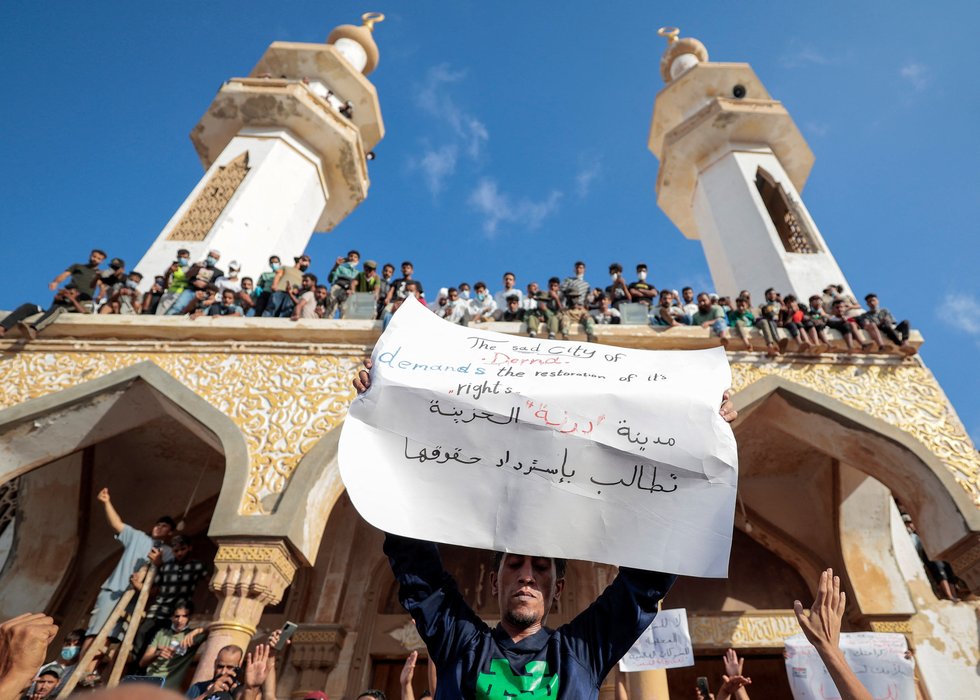
Libya’s rating has moved from closed to repressed, with marginal improvements in civic space having been observed during the past year. Although protesters are able to hold demonstrations, these are often violently dispersed by local militias, with accompanying incidents of detentions. A restrictive law that unduly allowed arbitrary suspension and dissolution of CSOs was suspended by the courts, but other repressive regulations are still operational.
Despite the gloomy picture, civil society in MENA continues to show remarkable resilience and solidarity in speaking out against violations.
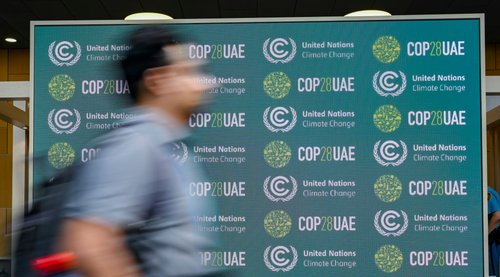
For example, as the UAE prepared to host the COP28 climate summit, CSOs joined efforts to demonstrate the glaring contradiction between the government’s efforts to present an image that promotes a diversity of voices while UAE HRDs face exile and prolonged imprisonment for speaking up. The UAE was added to the CIVICUS Monitor Watchlist in September. CSOs raised concern that over 60 prisoners of conscience remain in prison despite completing their sentences, the practice of torture and solitary confinement in prisons and detention centres, including against HRDs, remains widespread, HRDs and peaceful critics continue to be systematically targeted by the authorities in retaliation for their peaceful human rights work, while the recently adopted 2022 Cybercrime Law criminalises the work of journalists, whistleblowers, activists and peaceful critics in a bid to silence dissent. UAE authorities made clear that unauthorised protests and online dissent during COP28 would not be tolerated.
WOMEN: Unbowed heroines confronting oppression despite entrenched gender biases
As with several previous reports, throughout the MENA region, our analysis reveals the significant contributions of women in advancing civic space and promoting gender equality. From advocating for the abolition of the guardianship system and women’s right to drive in Saudi Arabia in 2017 and 2018, to taking a leading role in organising and mobilising protests in Lebanon’s 2019 popular uprising and participating in their thousands in Iraq’s 2019 popular protests, the CIVICUS Monitor continues to document the remarkable leadership that women have demonstrated across MENA in advocating for human rights, and women’s rights in particular.
Despite the heavy price involved, women have shown remarkable tenacity. Women and their advocates continue to face systematic targeting due to their peaceful human rights work, in what has been a persistent and visible aspect of civic space violations across MENA, and in a context of increasing gender repression.
In Iran, the first anniversary of the death of 22-year-old Mahsa Amini, who died in custody after being detained by the Iranian morality police for allegedly wearing an ‘improper’ hijab, sparking mass nationwide protests, was marred by a new round of detentions which began on 30 July 2023. At least 22 activists, most of them women, were arrested and detained in just one month.
In Syria, woman HRD Hiba Ezzideen Al-Hajji and the staff of the Equity & Empowerment Organisation were subjected to death threats and a fierce defamation campaign across several social media platforms in direct retaliation against their work defending women’s rights. The defamation campaign, conducted across Facebook, Telegram and WhatsApp, included anonymous pages that published explicit and fabricated images and employed offensive language to slander them.
In Saudi Arabia, internet activist and online fitness trainer Manahel Al-Otaibi, who uses social media to call for women’s rights, was arrested in November 2022 for calling for the abolition of the guardianship system. Her case is being tried by the Specialised Criminal Court (Terrorism Court), which was established to hear the cases of those accused of terrorism, but has often been used as a tool to imprison HRDs, and frequently imposes heavy sentences. Manahel’s two sisters, Fawzia and Maryam Al-Otaibi, have also been targeted by Saudi authorities. Maryam is a woman HRD who has been banned from travelling for more than four years due to her peaceful activism in defence of women’s rights on social media, while Fawzia, who lives in the UK, has received death threats for continuing to use social media to speak out about the plight of her sisters and the rights of women in Saudi Arabia. Women’s rights defender Salma Al-Shehab is currently serving one of the harshest sentences for her online advocacy for women’s rights, with a sentence of 27 years in prison, reduced from 34 years.
Civic Space Restrictions
In the MENA region the detention of HRDs, intimidation and harassment, censorship, detention of journalists and prosecution of HRDs were the top five civic space violations over the past year. The violations remain largely the same as in the previous year’s report, with detention of HRDs taking the lead this year after being in fourth place last year.
Detention of HRDs
The detention of HRDs, the most documented violation in MENA, was reported in at least 12 out of 19 countries. HRDs were detained for a range of reasons relating to their peaceful human rights work. In particular, HRDs were often detained for expressing opinions and advocating for human rights on their social media accounts, with women HRDs particularly targeted for advocating for the rights of women both online and offline.
In Palestine, in events before the start of the current conflict, Israeli forces arrested HRD Issa Amro in December 2022 after he was summoned for an investigation at the Ja’bara Israeli police station just days after documenting and publishing a video of Israeli soldiers violently attacking an Israeli activist during a solidarity visit. In Iraq, security forces arrested a political analyst, Dr Mohammad Na’na Hassan, in Baghdad following a complaint filed against him by Prime Minister Mohammed Shia Al-Sudani, who accused Dr Hassan of attacking him verbally before he assumed office. In Oman, online activist Majid bin Abdullah Al-Ruhaili, who uses his Twitter account to advocate for political and legal reform, was kidnapped by the Internal Security Service in Muscat and held incommunicado just two days after he tweeted about the use of election propaganda.
As discussed above, in Iran, women and those advocating for the rights of women were targeted in a new round of detentions that started in late July 2023. Those detained included prominent women’s rights activists, lawyers and journalists, held on charges of ‘spreading propaganda against the state’ and ‘assembly and collusion against national security’.
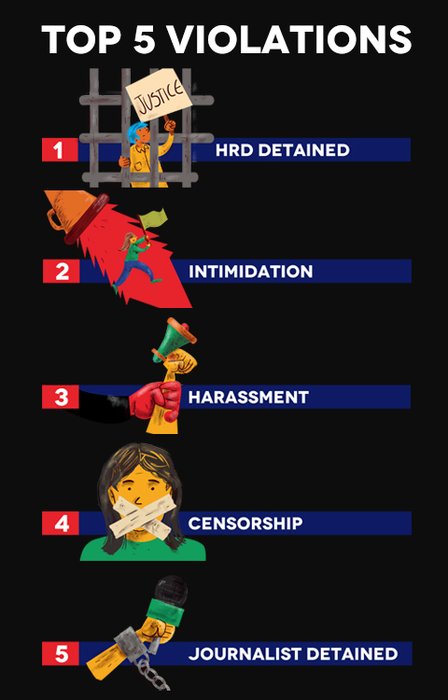
Intimidation and Harassment
Intimidation and harassment were the second and third most documented violations in MENA, with intimidation reported in at least six countries and harassment in at least eight. Intimidation was mostly used against journalists, followed closely by HRDs, CSOs and media outlets.
Intimidation occurred through a range of means. In some instances, as seen in Lebanon, authorities summoned journalists to interrogate them arbitrarily in relation to their work, often without any accompanying official charges. Jean Kassir of the General Directorate of State Security summoned the co-founder of independent media outlet Megaphone in relation to a Twitter post by Megaphone that accused Lebanese leaders of being fugitives of justice. The investigation against Kassir was dropped following protests and condemnation by Lebanese CSOs. In Tunisia, similar interrogations took a different tack, sometimes involving arbitrary searches and arrests, as seen in arrest of Mosaique FM head Noureddine Boutar. Police questioned him over the station’s operations, including on who takes editorial decisions on the station’s programming and choice of guests, all while failing to disclose the reason for the arrest.
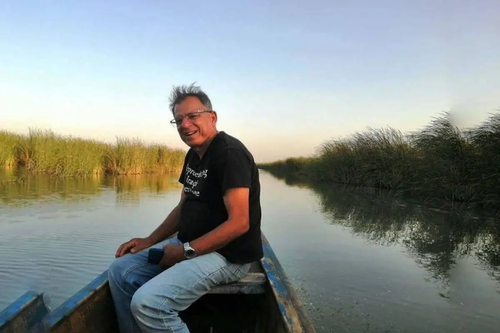
Abductions and kidnappings were also used in some instances to intimidate activists, as seen in Iraq when an unknown armed group in civilian clothes kidnapped prominent environmental activist Jassim Al-Asadi as he travelled by car. Al-Asadi was later released after what appeared to have been an intervention by the Iraqi government. He revealed that he was subjected to ‘most severe forms of torture’ using ‘electricity and sticks’ and was moved from place to place during his captivity.
With regard to harassment, authorities have often misused the criminal justice and legal systems to punish HRDs unduly. In Kuwait, the courts sentenced blogger Salman Al-Khalidi in absentia to another three years in prison in connection with his peaceful human rights activities. He had previously been sentenced to five years in prison with hard labour in a separate case in May 2023, among other sentences.
Online threats and online harassment were also documented as a major harassment tactic, particularly against women activists, including in the case of Hiba Ezzideen Al-Hajji in Syria.
Censorship
Censorship remained a major area of concern as the fourth most-documented violation in MENA, reported in at least nine out of 19 countries.
In some instances, legislative changes were used or attempted as a tactic to introduce censorship, as seen in Kuwait, where the Ministry of Information prepared a draft law that contains a prohibition on criticising the Emir, the Crown Prince and the Deputy Emir, and prevents the publication of their news or activities without prior Emiri approval. It also contains clauses in its section on publications on ‘insulting or disrespecting the country’s constitution’ and ‘violating public morals’. The proposed bill faced widespread opposition from civil society, including HRDs, as well as a large number of parliamentarians, due to the restrictions it would place on freedom of expression.
Similarly in Jordan, a draft Cyber Crime law that proposes to criminalise publication of the names or pictures of public officials without authorisation, and uses vague terms such as ‘fake news’, ‘promoting, instigating, aiding or inciting immorality’, ‘online assassination of personality’, ‘provoking strife’, ‘undermining national unity’, and ‘contempt for religions’, has raised concern that it would increase online censorship and open opportunity for abuse by authorities.
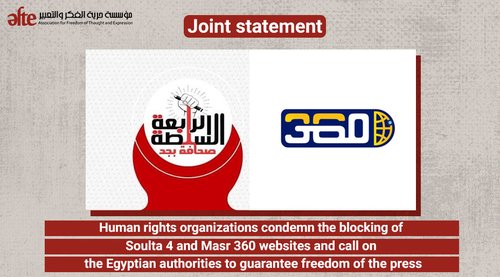
Another form of censorship was internet restrictions on online news outlets, as seen in Egypt, where the authorities blocked the Masr 360 and Soulta 4 news websites, believed to be in relation to the content they publish. While the Soulta 4 website covers political and party news, particularly news of the opposition Civil Democratic Movement, the Masr 360 website mainly provides news of human rights violations and had recently criticised the acquisition of Egyptian assets by Emirati companies.
More blatant forms of censorship were seen in countries including Lebanon, where the Minister of Interior and Municipalities, Bassam Mawlawi, banned two LGBTQI+ events scheduled for November 2022, despite a decision by the State Consultative Council confirming the illegality of the minister’s decisions to prevent activities related to LGBTQI+ rights. In Palestine, the Israeli Minister of National Security issued a decision banning the work of ‘Palestine TV’ inside the Occupied Territories for a six-months period. Intelligence officers interrogated the outlet’s journalists and warned them of arrest in case of non-compliance with the decision. In Iraq, the Communications and Media Commission stopped the broadcast and deleted all previous episodes of the Al-Kasir series, which was shown on the UTV Iraqi satellite channel. The decision was based on ‘complaints received by members of the Parliament and tribal elders’.

Palestine
Israeli occupation continued threatening the lives of journalists, inflicting physical injuries and preventing coverage of various events. International groups such as Reporters Without Borders continue to issue statements calling on Israel to end its systematic attacks on Palestinian journalists, which are encouraged by impunity.
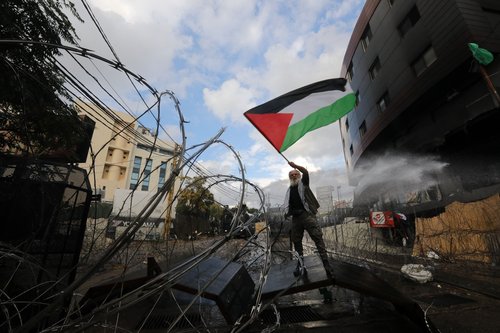
The already challenging and brutal civic context is exacerbated by the escalating conflict in the context of Israel’s forceful occupation of Palestine and the 16-year siege of Gaza. On 7 October 2023, Hamas forces launched an unprecedented attack on Israel, resulting in a devastating assault on the civilian population in areas near Gaza. This assault caused over 1,000 deaths and more than 200 people were abducted. In response, Israel’s actions have led to a significant number of civilian casualties in Gaza, with more than 11,000 reported fatalities as of 13 November 2023. Over 62 per cent of the victims in Gaza were women and children. MADA Palestine reports that over 30 journalists have been killed by Israeli bombs and attacks as of the beginning of November 2023.
In the northern part of Gaza, over a million people were faced with the difficult choice to flee or confront death. However, with closed borders, there was no safe haven in sight. A total siege of Gaza left people deprived of basic necessities, including water, food, fuel and medicines, leading many to describe what was happened as an ethnic cleansing exercise.
In response to these tragic developments that have garnered international attention, people in multiple countries have mobilised in solidarity with the victims (see more in the Europe and Central Asia section). CSOs have called for an immediate ceasefire and for international efforts to address the root causes of the ongoing conflict.
Before the current bombings, the CIVICUS Monitor documented civic space violations during the year. In November 2022, no less than 21 violations were reported, with 12 committed by the Israeli Occupation Forces (IOF), seven committed by various Palestinian authorities in the West Bank and Gaza and two committed by social media networks. In December 2022, 29 violations were documented, 12 of which were committed by the IOF, seven by Palestinian authorities in the West Bank, and two by social media networks. In February 2023, 11 physical assaults were documented.
Amid a growing tide of infringements, these violations have persisted within an increasingly stifling legal framework. CSOs continue to voice their opposition to the 2022 Non-Profit Companies Bylaw and call for its repeal. This bylaw, regarded by Palestinian civil society as another in a series of measures designed to constrict the Palestinian civic landscape, contains provisions that actively undermine and constrict the activities of CSOs. Among these restrictive clauses are requirements for pre-approval from authorities concerning both the receipt and disbursement of contributions. In the face of a relentless assault on Palestinian CSOs by Israeli authorities, CSOs have expressed concern that these legal provisions could be exploited to further stifle the voices of CSOs in Palestine and cloak Israeli authorities’ violations against these organisations.
| COUNTRY | SCORES 2023 | 2023 | 2022 | 2021 | 2020 | 2019 | 2018 |
| ALGERIA | 31 | ||||||
| BAHRAIN | 15 | ||||||
| EGYPT | 18 | ||||||
| IRAN | 11 | ||||||
| IRAQ | 19 | ||||||
| ISRAEL | 51 | ||||||
| JORDAN | 40 | ||||||
| KUWAIT | 32 | ||||||
| LEBANON | 47 | ||||||
| LIBYA | 29 | ||||||
| MOROCCO | 45 | ||||||
| OMAN | 22 | ||||||
| PALESTINE | 23 | ||||||
| QATAR | 27 | ||||||
| SAUDI ARABIA | 4 | ||||||
| SYRIA | 6 | ||||||
| TUNISIA | 37 | ||||||
| UNITED ARAB EMIRATES | 15 | ||||||
| YEMEN | 12 |
